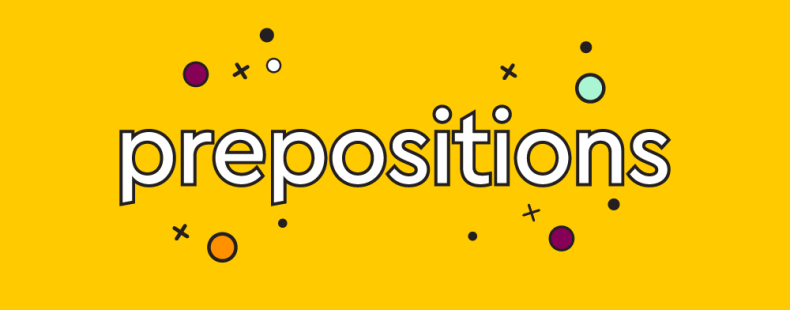A preposition is a word which shows the relationship between two objects indicating their position.
Example: The book is on the table. (On shows the relationship between the book and the table)
Some of the important prepositions are listed below
PREPOSITIONS SHOWING TIME
1. At, in
At in used with a definite point of time in mind.
I go to my Department at 7:30 a.m. everyday.
He will come at Holi.
In is generally used to denote a specific time, period month, year.
I play chess in the evening.
Exception: At is used with noon.
He comes at noon for lunch.
2. On, by
On is used with days and dates.
He was born on the 9th of July.
I teach Wordsworth on every Monday.
By refers to the latest time by which an action will be over.
The meeting will break by 4 p.m.
3. For, Since
For denotes a period of time and is used with the perfect continuous tense.
I have been working in KR Mangalam University for the last 10 years.
Since shows the point of time. It also indicates continuity.
India has been independent since 1947.
4. From
From refers to the starting point of an action.
He is joining the new firm from the 1st of May.
PREPOSITIONS SHOWING POSITION
1. At, in
At refers to an exact point.
He lives at Nehru Place.
In refers to a big area.
He lives in Punjab.
2. Between, Among
Between is used to distinguish two persons and things.
The property was divided between Ram and Shyam.
Among is used for more than two persons or things.
The food was distributed among the ten boys in the family.
3.Amongst
Amongst is also used with more than two persons or things but is always used before a vowel.
Divide the oranges amongst us.
4. Above, under
Above is used for higher than.
The aeroplane was flying high in the sky, in fact, above the clouds.
Below is used for lower than.
His output is below ours.
5. Under, over
Under is used for vertically below.
We sit under the tree when we have no class.
Over indicates something vertically above.
There is a separate room over the garage.
6. Beneath
Beneath shows a lower position.
The ground was soiled beneath her.
PREPOSITIONS SHOWING DIRECTION
1. To is used to indicate movement from one place to another.
The children go to the school every morning.
2. Towards points out a particular direction.
The lion ran towards the hunter.
3. Into indicates a movement inside something.
The thief entered into the room.
4. At indicates aim.
The hunter aimed at the bird.
5. For denotes direction.
I shall start for Patna today.
6. Off refers to separation.
He was thrown off from the car during the accident.
7. From refers to a point of departure.
We feel unhappy when we depart from our parents
8. Against shows pressure.
I rested my arms against the wall.
9. Along shows the same line.
I walked along the road.
10. Across means from one side.
I ran across the road
11. Before denotes face-to-face.
I was standing before my wife.
12. Behind means at the back of someone or something.
My daughter stood behind me.
13. Beside means by the side of.
The security guard sits beside the officer.
14. After refers to a sequence.
The child came running after the mother.
WORDS TAKING MORE THAN ONE PREPOSITION
A large number of words are always followed by a fixed preposition.
Example: Insist on; prevent from; fond of. But certain words take several prepositions
according to the changing meanings of the word. Here is a select list of such words.
1. Accompany
A. By (for living being)
The Prime Minister was accompanied by the members of his cabinet.
B. With(Subtle things)
His lecture was accompanied with subtle analysis of concepts.
2. Accountable
A. To (an authority or a person)
All of us are accountable to God.
B. For (action)
We are accountable to God for our deeds and misdeeds.
3. Angry
A. At (a thing). Ram is angry at Sham’s bad conduct.
B. With (a person).Ram is angry with Sham.
4. Annoyed
A. With (a person). He is annoyed with his younger brother.
B. At (something). He is annoyed with his friend at his laziness.
5. Answerable
A. To (a person). The servant is answerable to the master.
B. For (something). We are answerable to our parents for our conduct.
6. Appeal
A. To (person). He appealed to the judge for his release from jail.
B. For (thing). He appealed for his release from the prison.
7. Arrive
A. At (small place). He arrived at the railway colony.
B. In (big place). He arrived in India.
8. Attend
A. To (duties, lessons, work). I attend to my duties sincerely.
B. On (service). Children attend on parents.
9. Authority
A. On (subject). Mr. Suresh is an authority on Modern physics.
B. Over (rights). The District Magistrate has authority over the Committee.
10. Blind
A. Of (Physical). He is blind of one eye.
B. To (mental). Many parents are blind to the faults of their children.
11. Communicate
A. With (to make correspondence). He communicated with us on that matter.
B. To (to convey). He communicated his opinion to me.
12. Compare
A. With (Similar things). Shakespeare is compared with Kalidasa.
B. To (dissimilar things). Life is compared to a battle.
13. Compete
A. With (Person). I cannot compete with the young man.
B. For (a thing). They compete for a prize.
14. Complain
A. To (person). He complained to the Magistrate against Sham.
B. Against (a person). He complained to the Magistrate against Sham.
C. About (a thing). He complained to the Magistrate against Sham about his misconduct.
15. Confer
A. On (to give). The president conferred the title of Bharat Ratna on him.
B. With (a person). I shall confer with him about important topics.
16. Die
A. Of (a disease). He died of cholera.
B. From (a cause). He died from overwork.
17. Differ
A. With (person). I differ with you.
B. From (things). India differs from Japan.
18. Disqualified
A. From (action). He was disqualified from running the race.
B. For (post or thing). He was disqualified for the post of Police Inspector.
19. Entrust
A. With (in case of a person). I cannot entrust him with my money.
B. To (in case of thing). I cannot entrust my money to him.
20. Familiar
A. With (person). I am familiar with the Chief Minister.
B. To (subject). I am familiar to French Language.
21. Fight
A. With (person). We fought with the English.
B. For (thing). We fought with the English for freedom.
22. Grateful
A. To (person). I am grateful to Ram.
B. For (thing). I am grateful to Ram for his help.
23. Heir
A. Of (descendant). A son is usually the heir of the father.
B. For(thing). He was a heir for a big fortune.
24. Indebted
A. To (a person). I am indebted to my friend.
B. For (thing). I am indebted to my friend for his help.
25. Indignant
A. With (person). He was indignant with his friends.
B. At (thing). The teacher was indignant at his carelessness.
26. Live
A. On (to exist). A man lives on food.
B. By (to depend on, to believe in). A terrorist lives by the gun.
27. Part
A. From (persons). He parted from his friends.
B. With(things). He cannot part with his money.
28. Responsible
A. To(person). He was responsible to the boss.
B. For(thing). We are responsible to God for our actions.
29. Taste
A. Of(experience). Now you will have a taste of New York.
B. For(interest). I have no taste for painting.
30. Tired
A. Of(mental). I am tired of poverty.
B. With(physical). I am tired with working for five hours continuously.
Featured image courtesy: thesaurus



